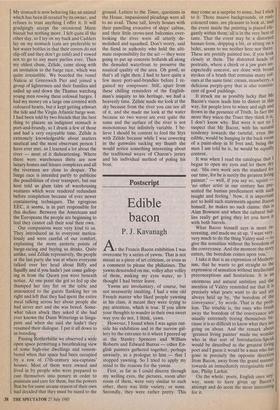Postscript
Edible bacon
P. J. Kavanagh At the Francis Bacon exhibition I was overcome by a series of yawns. That is not meant as a piece of art criticism, or even as a comment to please the philistines. The yawns descended on me, volley after volley of them, making my eyes water, so I thought I had better leave.
Yawns are involuntary, of course, but not necessarily insulting. I had a wise old French master who liked people yawning in his class, it meant they were trying to pay attention, which is true. If you allow your thoughts to wander in their own sweet way you do not, I think, yawn.
However, I found when I was again out- side his exhibition and in the narrow gal- lery by the entrance to it where I peered up at the Stanley Spencers and William Roberts and Edward Burras — other En- glish painters gathered together, perhaps unwisely, as a prologue to him — that I stopped yawning. So I tried to apply my mind to the reasons for the yawns.
First, as far as I could discern through my welling eyes, the pictures, room after room of them, were very similar to each other, there was little variety, or none. Secondly, they were rather pretty. This may come as a surprise to some, but I stick to it. Those mauve backgrounds, or rust- coloured ones, are pleasant to look at, and the event inside the painting is placed ele- gantly within them; all is in the very best of taste. That the event may be a distorted human form, dripping a bit, or sitting on a bidet, seems to me neither here nor there. These are prettily painted too, if you look closely at them. The distorted heads of portraits, where a cheek or a jaw goes un- expectedly concave, are done with broad strokes of a brush that contains many col- ours at the same time: cream, strawberry, a delicious purply-grey that is also reminis- cent of good puddings. It struck me as possibly lucky that Mr Bacon's vision leads him to distort in this way, for people love to wince and sigh and frown in the presence of Truth. In fact the more they wince the Truer they think it is, I don't know why. But were it not so I suspect that Mr Bacon, with his natural tendency towards the tasteful, even the edible, would be hanging in the back room of a paint-shop in St Ives and, being the man I am told he is, he would be equally content.
It was when I read the catalogue that I began to open my eyes and let them drY out. 'His own work sets the standard for our time, for he is surely the greatest living painter;' — well, if you say so, squire — 'no other artist in our century has pre- sented the human predicament with such insight and feeling.' Now, it is important ,not to hold such statements against Bacon himself, he makes no such claims: this Is Alan Bowness and when the cultural bul- lies really get going they let you have it with both barrels.
What Bacon himself says is more in- teresting, and made me sit up. 'I want very, very much to do the thing Valery said —10 give the sensation without the boredom of the conveyance. And the moment the story enters, the boredom comes upon you.'
I take it that is an expression of Modern- ism, that he wants to get straight to the expression of sensation without intellectual preconceptions and hesitations. It is an enormous and natural ambition and the mention of Valery reminded me that it is precisely what poets want to do and are always held up by, 'the boredom of the conveyance', by words. That is the prob- lem. The trouble is, the ones who brush away the boredom of the conveyance are usually extremely boring themselves be- cause it is so difficult to know what they are going on about. And the remark about 'greatest living painter' made me wonder who in that sort of Introduction-Speak would be described as the greatest living poet and I guess it would be a man who has gone in precisely the opposite direction from Bacon, away from the grand manner towards an immediately recognisable real- ism, Philip Larkin.
On the whole, poets, English ones Or way, seem to have given up Bacon s attempt and do seem the more interesting for it.














































 Previous page
Previous page